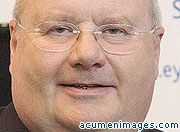Fears that European judges could force churches to conduct gay weddings against their will are “legitimate”, Cabinet Minister Eric Pickles has said.
The Communities Secretary says robust legal protections will be needed if the Government goes ahead with plans to redefine marriage.
But critics of the Government’s plans say the only way to properly protect liberty of conscience is to drop the redefinition of marriage altogether.
Slur
A recent legal opinion by a top human rights lawyer says teachers and public sector chaplains could be sacked if they refuse to endorse gay marriage.
Eric Pickles’ comments come in the wake of a statement released by the office of Deputy Prime Minister Nick Clegg calling opponents of gay marriage “bigots”.
The slur, which was later retracted, was called highly offensive by the former Archbishop of Canterbury, Lord Carey.
Reaction
In an article for The Daily Telegraph, Mr Pickles attempted to calm the situation.
He said: “I recognise that the Government’s consultation on equal civil marriage has created a strong reaction from many in religious circles.
“In particular, there are legitimate fears of European Court of Human Rights challenges and churches being forced down the line to conduct such ceremonies against their wishes.
Coercion
“These concerns need to be explicitly addressed in any legislative reform to provide safeguards against such coercion.”
Mr Pickles also said he strongly supports the role of Christianity in public life, but recognises that “aggressive secularism” has undermined religious freedom in “the more politically correct parts of the public sector”.
He referred to recent cases heard by the European Court of Human Rights involving British Christians who say they have suffered workplace discrimination.
Nonsense
The UK Government opposed those cases and, during the court hearing, the UK Government’s lawyer said Christians should leave their faith at home or find another job.
But Mr Pickles attempted to row back on the Government’s position. He said: “Banning discreet religious symbols for reasons of political correctness is not acceptable. We should challenge the nonsense that religious displays could ’cause offence’ and therefore should be hidden from view.
“The Government’s opposition to a European Court of Human Rights challenge on crucifixes should not be misinterpreted as supporting secularism: rather, we are resisting Brussels interference and gold-plating of what should be a matter for common sense.”

